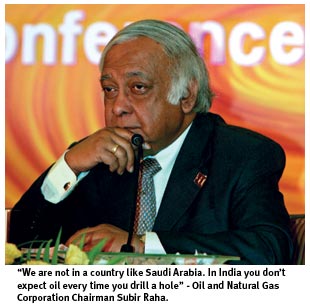| |
India plays catch up in the global oil asset race
India’s most valuable company, Oil and Natural Gas Corp., looked set last year to take the world’s oil industry by storm, snatching foreign assets from under the noses of Chinese and Western rivals.
But while it has not turned out quite as dramatic as some thought, India has not been thwarted in its ambition to secure future oil supplies for its billion plus population.
ONGC gained junior shares in a host of projects, from Russia’s Sakhalin-1, Iran’s Yadavaran oilfield and Sudanese properties abandoned by Western investors.
But it has yet to take a lead role that would give it more say and a bigger share of future production. “They are sleeping partners. Anybody can do that,” says T.N.R. Rao, India’s former petroleum secretary.
The race is gaining urgency both for India and ONGC as Asian  competitors snap up properties. And ONGC has not been finding more oil than it pumps out. For three years in a row, the firm has failed to replace the reserves it produced. Its last major oil discovery was in 1974. competitors snap up properties. And ONGC has not been finding more oil than it pumps out. For three years in a row, the firm has failed to replace the reserves it produced. Its last major oil discovery was in 1974.
The company found new oil reserves equivalent to 43 per cent of the 26 million tonnes it produced in 2002/03, a ratio that fell to 24 per cent the next year before rising to 74 per cent in 2004/2005, official data show. Production was flat throughout.
It has added more gas to its reserves than it produced but gas output itself declined 20 per cent over the same period.
Most of India’s hyperactive efforts to strike deals and seek partners all over the world are aimed at filling the energy gap in the development that India is seeking to achieve over the next two decades.
India’s state-owned oil companies are being pushed heavily to achieve success abroad by Petroleum and Natural Gas Minister Mani Shankar Aiyar. “If we want to be a global player, we have to be integrated,” he said. Aiyar said Indian companies could explore opportunities in countries such as Romania, Turkey, Azerbaijan, Kazakhstan and Iran. “We won’t get investments in India unless we are seen ourselves as an investor outside,” he said.
ONGC Videsh, the company’s offshore exploration arm, along with steel billionaire Lakshmi Mittal, were licking their wounds after being humbled by China’s CNPC in a high-profile race to acquire Canada’s PetroKazakhstan. Though there were suggestions that ONGC Videsh and Mittal would counter the Chinese bid of $4.18 billion with a higher offer before the Canadian company’s board meets this month.
In addition, EnCana sold its assets in Ecuador to Andes Petroleum, a consortium of Chinese energy firms that includes CNPC, in a further disappointment for ONGC, which was also in the running for EnCana.
ONGC was handed a minor role, however, in one of Nigeria’s most prospective offshore exploration properties after Korea National Petroleum offered huge infrastructure investments to take a majority stake.
In the past few years ONGC has drilled dry wells in Libya, Australia and Ivory Coast, while security concerns have delayed work in Sudan’s Block 5B. Last year it lost a bid to acquire a major stake in Angola, again to a Chinese rival.
On the domestic front, the only increase in domestic production has come in 5 per cent of the fields operated by foreign companies, said Rao, the oil ministry’s top bureaucrat when foreign firms were invited to operate some Indian oilfields.
Government officials say ONGC must boost reserve to production ratios by improving drilling technology and management practices. “ONGC’s ratio is 22 years. In some on land areas the ratio is 57 years,” one official said.
ONGC also lost a major offshore platform at Mumbai High, India’s largest oilfield, reducing the company’s output by 123,000 bpd after a rig crashed into the facility during the monsoons, setting it on fire.
It missed out on the country’s biggest find in two decades, the Rajasthan field being developed by Scottish oil and gas explorer, Cairn Energy.
In addition it has fallen short in gas, lagging Reliance Industries, which discovered 14 trillion cubic feet (tcf) of gas, and newcomer Gujarat Petroleum, which found 20 tcf.
However, as ONGC chairman Subir Raha put it recently: “We are not in a country like Saudi Arabia. In India you don’t expect oil every time you drill a hole.”
|
|



